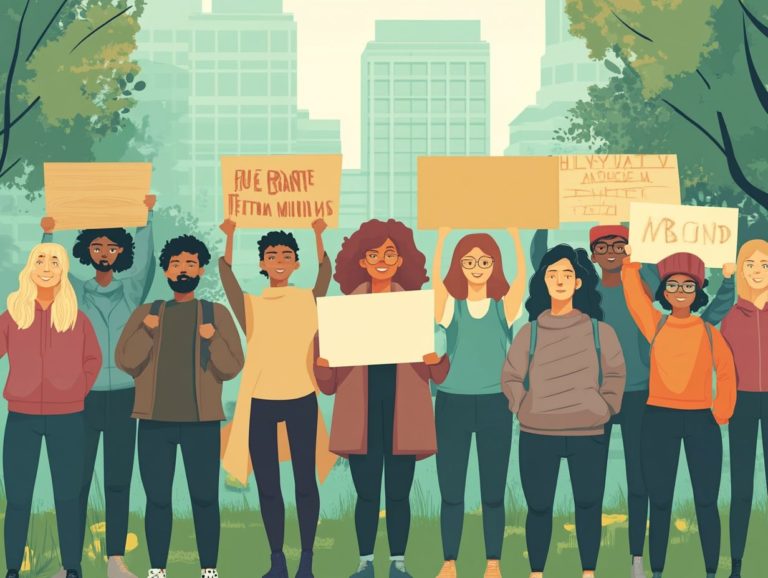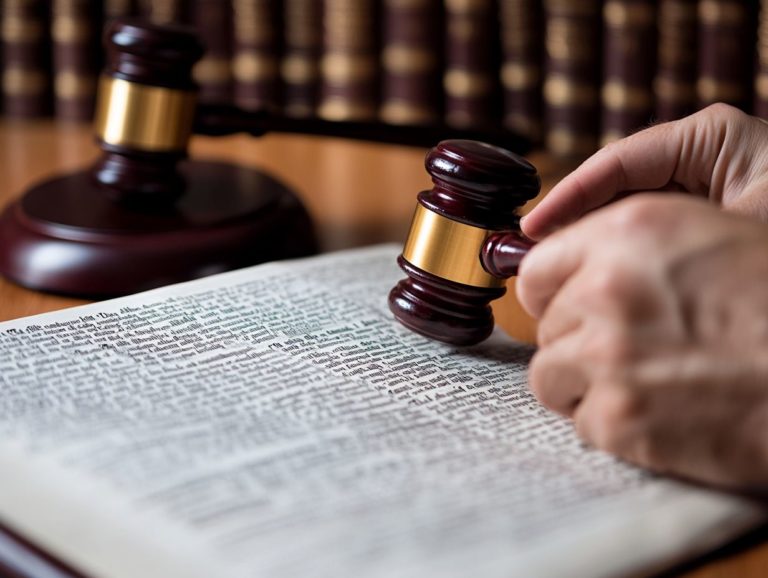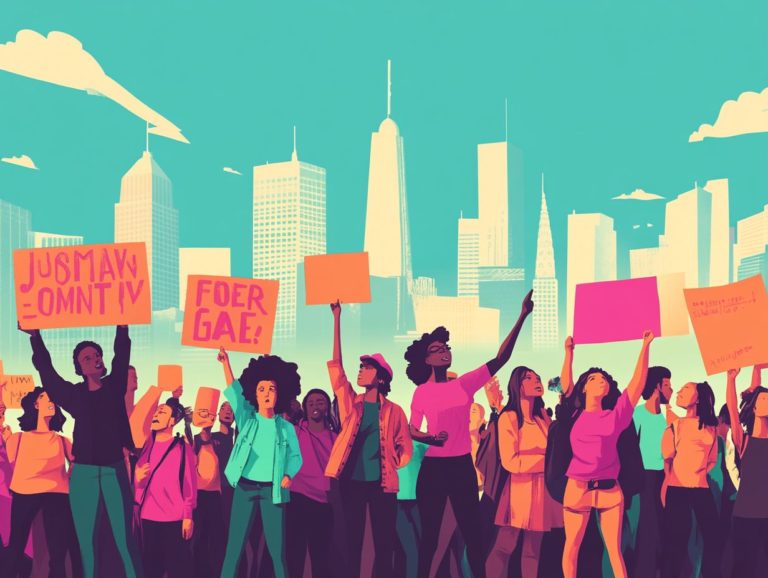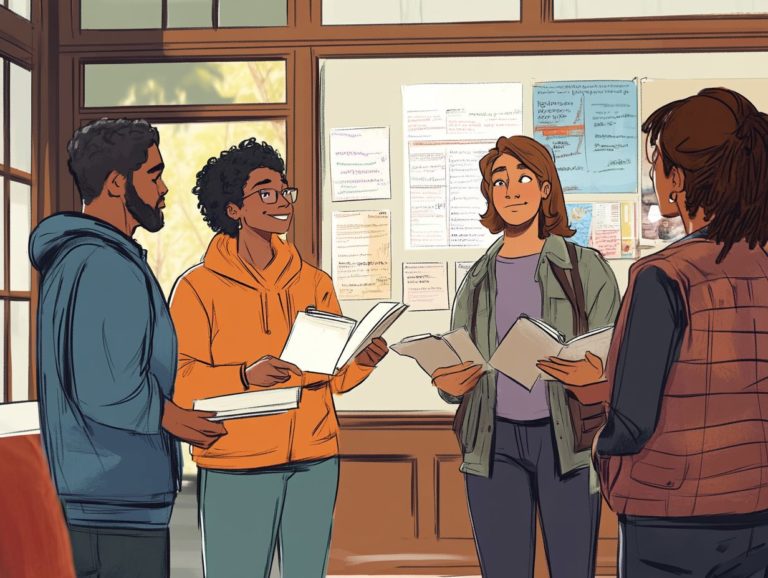Understanding Conditional Release and Your Rights
Conditional release is pivotal in the criminal justice system, presenting you with a pathway to reintegrate into society while following specific guidelines.
This guide delves into the definition and various types of conditional release, outlining your rights within a release agreement and the essential steps in the process.
You ll find information on common conditions, what unfolds if those conditions are violated, and the options at your disposal for appealing decisions.
Whether you re navigating the complexities of the system or simply seeking to expand your understanding, this guide offers valuable insights into conditional release and your protections.
Contents
Key Takeaways:

Conditional release means you can be released early from custody if you follow certain conditions. You have rights and should know how to protect them.
If you break the rules of your conditional release, there can be serious consequences. However, you have the right to appeal any decisions made against you.
What is Conditional Release?
Conditional release, also known as early release under supervision, is a legal framework that enables individuals with criminal convictions to reenter society under specific conditions established by the Minnesota Department of Corrections. Think of it as a transitional phase guiding offenders from incarceration toward full freedom.
This arrangement often includes requirements like reporting to a parole officer, steering clear of any criminal activity, and following other stipulations aimed at ensuring public safety.
This process is especially pertinent for those convicted of serious offenses, such as felony DWI and sex crimes. It underscores the critical role of good behavior in maintaining release status.
Definition and Types
In Minnesota, conditional release encompasses options such as supervised release and parole, each carefully crafted to assist offenders in reintegrating into society while meeting legal standards.
Supervised release is typically reserved for individuals who have served time for serious offenses, allowing them to transition back to community life under close monitoring. This often involves regular check-ins with a supervising agent to ensure compliance.
Parole is generally granted after an individual has completed a portion of their prison sentence, permitting them to finish their time in the community under specific conditions.
Understanding these nuances is essential, as they carry distinct legal implications, including varied eligibility criteria and compliance requirements that affect the rights of individuals navigating their conditional release. The structured support offered through these programs is designed to reduce recidivism rates and promote a smoother adjustment to life outside of incarceration.
Your Rights in a Conditional Release Agreement
Understanding your rights within a conditional release agreement is essential for your protection! This knowledge ensures that you receive fair treatment under Minnesota law.
Understanding Your Rights and Protections
Individuals on conditional release in Minnesota have specific rights and protections designed to ensure they receive fair treatment within the legal system. Getting legal help is vital for your success in these situations!
These rights enable you in your interactions with authorities, providing a safeguard against any unlawful violations that could undermine your dignity and liberty. While individual freedom and community safety must be balanced, these provisions create a framework that ensures your rights are acknowledged and respected.
This delicate balance is essential; it seeks to protect public safety without compromising the fundamental freedoms that form the bedrock of the justice system. In doing so, it fosters a more equitable and responsible approach to rehabilitation, allowing you to move forward while still being part of a safe community.
In conclusion, understanding conditional release is crucial for navigating your rights and protections effectively. If you need assistance, don t hesitate to seek legal help!
The Conditional Release Process
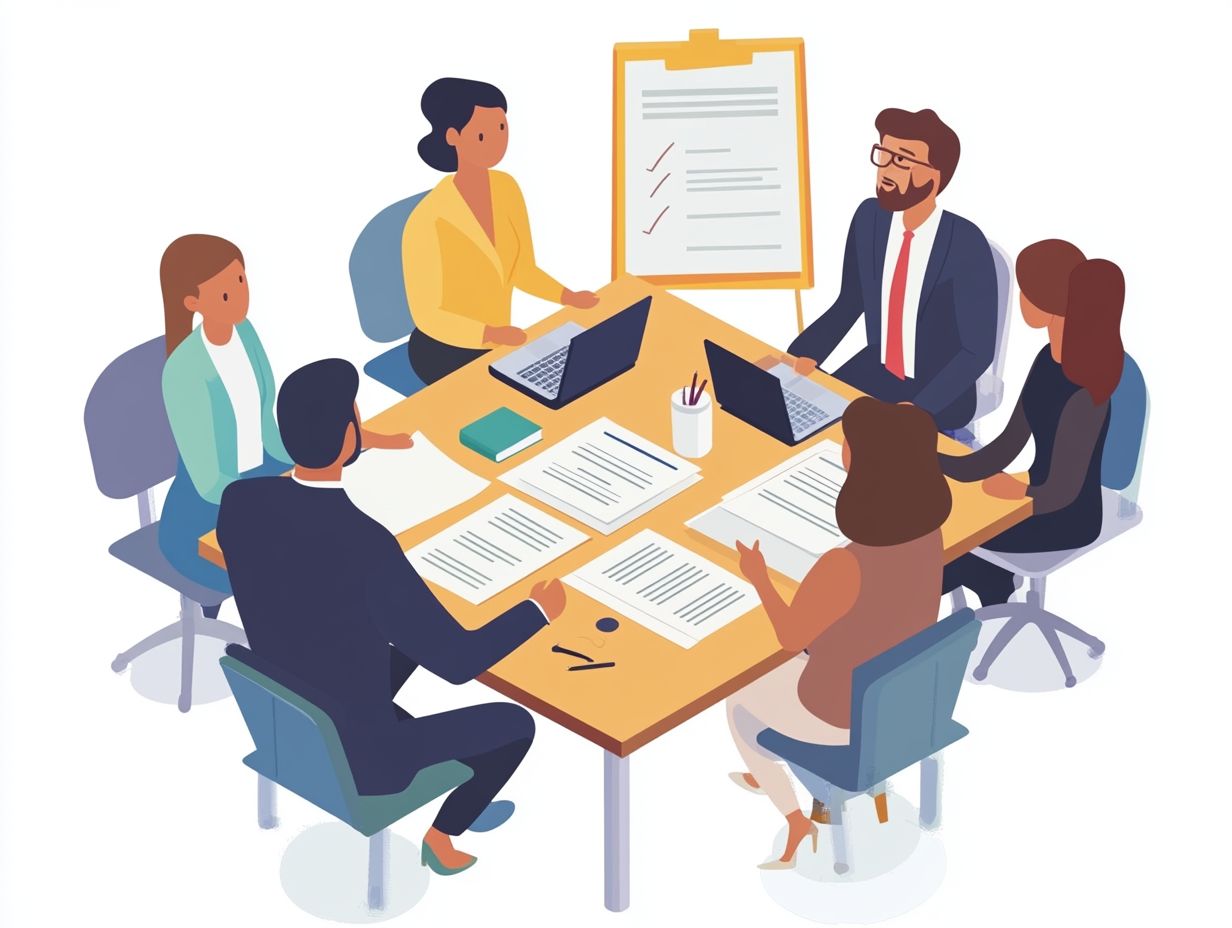
The conditional release process in Minnesota unfolds as a clear series of steps designed to facilitate the early release of offenders.
This process ensures that all established requirements set forth by the parole board and the Department of Corrections are properly followed, promoting a fair and systematic approach to reintegration.
Steps and Requirements
Navigating the steps and requirements of conditional release in Minnesota requires a clear understanding of the necessary evaluations and rules you must follow set forth by the parole board.
Your journey starts with submitting a formal release application. This application serves as the foundation for the entire review process.
Next, you need to attend a hearing where a panel will assess your case. They will consider key factors such as your behavior, rehabilitation progress, and readiness for reintegration.
After navigating this phase, fulfill any mandatory terms. This may include community service or attending counseling sessions.
Each step is significant. Compliance showcases your accountability and commitment and greatly increases your chances of achieving a favorable outcome regarding parole release.
Conditions of Release
Conditions of release in Minnesota are strict requirements placed on individuals under conditional release. These measures are designed to ensure public safety while aiding in a smooth reintegration into society.
Common Conditions and Their Implications
Common conditions tied to conditional release often come with specific requirements, such as abstaining from alcohol for those with felony DWI convictions and facing restrictions for individuals convicted of sex crimes.
These stipulations serve a dual purpose. They aim to support the reintegration of individuals into society while also bolstering public safety by reducing the likelihood of reoffending.
For example, if you have a history of alcohol-related offenses, your ability to participate in social gatherings may be significantly limited. This promotes a sense of accountability and vigilance.
Individuals with sex crime convictions face strict monitoring and restrictions on their interactions, especially with vulnerable populations.
Non-compliance with these conditions can quickly lead to serious consequences, such as the revocation of your release status.
Adhering to these requirements is crucial for your freedom and community safety.
Violations and Consequences of Conditional Release
Violating your conditional release in Minnesota can result in severe consequences, including the revocation of your release status and the possibility of returning to incarceration.
You must understand your legal options and rights in this situation. Understanding these implications can enable you to navigate the complexities of the law effectively.
What Happens if You Violate the Terms?

If you find yourself in violation of your conditional release in Minnesota, prepare for serious repercussions, including immediate arrest, a hearing to evaluate the violation, and the possibility of returning to prison.
This process typically starts with a notice outlining the alleged violation. This leads to a prompt response from legal authorities.
At this stage, the role of the legal system becomes paramount. It details the procedures for the upcoming hearing where evidence will be presented and scrutinized.
Navigating this potentially overwhelming experience without legal counsel can be risky. An experienced attorney can offer invaluable support, guiding you through complex legal jargon and clarifying possible consequences of the violation.
Whether facing additional penalties or considering options for rehabilitation or defense, having proper representation can greatly influence the outcome, ensuring your rights are upheld throughout the proceedings.
Appealing a Conditional Release Decision
Appealing a conditional release decision in Minnesota requires you to navigate a nuanced legal landscape. This process lets you fight against unfavorable decisions. Take action to protect your rights!
How to Challenge a Decision or Condition
Challenging a conditional release decision or specific terms in Minnesota is entirely within your reach. You can navigate the appropriate legal avenues, making skilled legal representation crucial.
What options do you have? You can file motions within the court system or pursue appeals that could reconsider your case based on new evidence or legal arguments.
Why is it important to understand the legal standards? They ensure fairness. With effective legal counsel by your side, you can gain valuable insights into how these conditions might be contested.
Each approach can scrutinize whether the imposed terms are justifiable. It’s important to advocate for an outcome that aligns with both legal statutes and your unique circumstances.
Frequently Asked Questions
What is conditional release?
Conditional release means you can leave under certain conditions instead of serving your full sentence.
What are some examples of conditional release?

Examples of conditional release include probation, parole, and bail. These conditions can vary based on individual circumstances and the terms set by the court.
What are my rights regarding conditional release?
You have the right to be informed of the conditions of your release. You also have the right to a hearing if there are any changes to these conditions and the right to legal representation throughout the process.
Can my conditional release be revoked?
Yes, if you violate any of the conditions of your release, your conditional release can be revoked. You may be required to serve the remainder of your sentence or face other consequences.
What should I do if I do not understand the conditions of my release?
If you do not understand the conditions of your release, seek clarification from your legal representative or the court. It is your responsibility to fully understand and comply with the conditions set by the court.
What happens if I successfully complete my conditional release?
If you successfully complete your conditional release, you may be discharged from any further obligations, and your case may be closed. However, it is important to maintain good behavior and comply with all conditions set by the court during your release period.
If you need assistance with conditional release, don’t hesitate to reach out for legal help.

